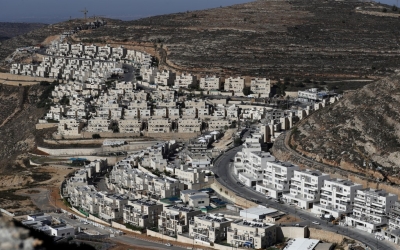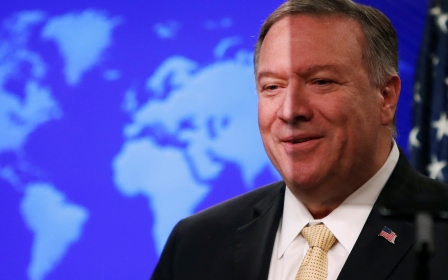International law is clear on one point: Israel's settlements are illegal

US Secretary of State Mike Pompeo made headlines around the world this week in announcing that the US had shifted its position, and no longer viewed Israeli settlements as a violation of international law.
In one of the stupider public statements of our time, Pompeo explained that “arguments about who is right and wrong as a matter of international law will not bring peace”. It is stupid, first, because there is no genuine argument about the unlawfulness of the settlements; until the US spoke out of turn, Israel was alone in defending their legality.
More definitively, the role of international law is to regulate the proper behaviour of sovereign states - not to make peace by negating the law’s relevance, which truly seems a cheer for the law of the jungle.
'Reality on the ground'
Pompeo removed any doubt about this when he justified the shift by admitting that the US “recognised the reality on the ground”. In plainer language, lawless behaviour can become lawful if sustained long enough by force - a logic that not only defies international law, but is contrary to the core legal commitments of the UN Charter.
Particularly in the area of peace and security, international law can be somewhat ambiguous. Opposing positions can be reasonably maintained, resolved by either an authorised tribunal or by practice sustained over time.
What makes the Pompeo move different is its positioning in relation to other controversial Trump moves and its whitewashing language
The establishment of settlements on occupied Palestinian territory, however, is an example of an issue upon which it is not possible to make a responsible argument in support of legality.
The unlawfulness of the settler encroachment has been pointed out repeatedly by informed observers as the biggest single obstacle to peace, and the most vivid and unabashed Israeli defiance of international law.
So, has Washington given Israel its blessing to do whatever it wants in the future regarding settlements - and for that matter, in the entirety of the occupied West Bank? After all, if the White House now endorses Israeli annexation of the Golan Heights in Syrian sovereign territory, the West Bank may be thought of as small potatoes.
The clarity of international law on the issue of Israeli settlements arises in part from the unusual fact that they have been formally declared illegal by the most authoritative sources of international guidance. Several key examples illustrate this international consensus.
Consensus of illegality
Firstly, Article 49 of the Fourth Geneva Convention states that an occupying power “shall not deport or transfer parts of its own civilian population into the territory it occupies”. This important provision of international humanitarian law is universally understood as prohibiting the establishment of Israeli settlements on any part of the occupied Palestinian territories.
If Israel was complying with international law, it should have ceased settlement activity and dismantled what had been built in the years after the 1967 war. Instead, Israel continued building, at an accelerated pace, advancing the lame rationale that Israelis should be able to live wherever they wish in Palestine.
Israel does not even view the areas of Jerusalem and the West Bank where settlements exist as being “occupied” in a legal sense, viewing this as part of the “promised land”.
Secondly, the International Court of Justice in 2004 strongly reaffirmed the unlawfulness of Israel’s settlement construction in occupied territory - and with a 14-1 ruling, the court showed a highly unusual degree of unity. T
he court pointed out that the separation wall was built so as to put on the Israeli side 80 percent of the settler population, noting in passing that the settlements were established in violation of applicable law. Israel refused to comply with this conclusive judgment, emphasising its “advisory” character.
Thirdly, in December 2016, the UN Security Council adopted Resolution 2334, deeming by a vote of 14-0 that the settlements had no legal validity. The US abstained from the vote. The resolution noted that the settlements constituted “a flagrant violation under international law and a major obstacle to the achievement of the two-state solution and a just, lasting and comprehensive peace”. It stressed exactly the opposite point to the one made by Pompeo.
Geopolitical significance
No country can, by its decree, influence the legal status of Israeli settlement activity. What Pompeo declared was a shift in the political position of the US government. It is legally insignificant, but geopolitically significant.
The Trump spin room sought to minimise the shift by recalling that Ronald Reagan, while president, once indicated off-the-cuff that he didn’t think the settlements were illegal - but as is not so often noted, he went on to suggest that settlement expansion was “unnecessarily provocative”.
More relevant was the exchange of letters by former US President George W Bush and former Israeli Prime Minister Ariel Sharon in 2004, in which they agreed that any viable peace deal with the Palestinians would allow the settlement blocs along the border to be incorporated into Israel.
Again, such a side agreement was without legal legs, representing nothing more than a geopolitical pat on Israel’s back - but it was a good indicator of what Israel and the US would demand in future peace negotiations.
What makes the Pompeo statement different is its positioning in relation to other controversial Trump moves and its whitewashing language, which gives Israel an incentive to move ahead with annexation. This is another instance of US overreach.
Final nail in the coffin
Palestinian resistance remains strong, as the Great March of Return along the Gaza-Israel fence illustrates, and global solidarity initiatives are gathering strength - a reality that Israel seems to acknowledge, by defaming its nonviolent opponents as antisemites.
Is this, then, the endgame of the Palestinian struggle? I think not
The new settlements rhetoric continues the pattern established by the Trump administration: repudiating the international consensus on key issues bearing on the rights and duties of states.
The highlights of this pattern in the Palestinian context have included moving the US embassy to Jerusalem, endorsing Israeli annexation of the Golan Heights, and now, sidelining as irrelevant the illegality of Israel’s settlements.
This step has been condemned in diplomatic circles as a final nail in the coffin of the two-state solution. It moves the political compass towards a one-state outcome, with the likelihood being Jewish dominance and Palestinian subjugation in a state structure that increasingly looks and behaves like an apartheid regime.
Is this, then, the endgame of the Palestinian struggle? I think not. Palestinian resistance and the global solidarity movement will be telling the world a different story.
The views expressed in this article belong to the author and do not necessarily reflect the editorial policy of Middle East Eye.
This article is available in French on Middle East Eye French edition.
Middle East Eye propose une couverture et une analyse indépendantes et incomparables du Moyen-Orient, de l’Afrique du Nord et d’autres régions du monde. Pour en savoir plus sur la reprise de ce contenu et les frais qui s’appliquent, veuillez remplir ce formulaire [en anglais]. Pour en savoir plus sur MEE, cliquez ici [en anglais].







